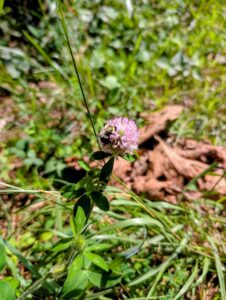The Sweet Work of Honeybees in Western North Carolina
 Amid the rolling hills of Western North Carolina, honeybees are quietly working their magic. These small but mighty pollinators support the ecosystems of the Blue Ridge and Smoky Mountains while producing some of the most distinct and flavorful honey in the region. As we become more conscious of what we eat and where it comes from, turning to local honey is a delicious way to support biodiversity, small farms, and your own health.
Amid the rolling hills of Western North Carolina, honeybees are quietly working their magic. These small but mighty pollinators support the ecosystems of the Blue Ridge and Smoky Mountains while producing some of the most distinct and flavorful honey in the region. As we become more conscious of what we eat and where it comes from, turning to local honey is a delicious way to support biodiversity, small farms, and your own health.
The Bees of Western North Carolina
Western North Carolina is home to a diverse population of native pollinators, including bumblebees, carpenter bees, and the beloved European honeybee (Apis mellifera). The unique microclimates and plant life of the region—from sourwood trees and tulip poplars to wildflowers and mountain herbs—create a perfect environment for bees to thrive and produce richly varied honey.
One of the region’s most prized varieties is Sourwood honey, known for its smooth texture, light amber color, and caramel-buttery finish. This honey is so distinct that it’s won national awards and is sometimes referred to as the “champagne of honeys.” The sourwood tree (Oxydendrum arboreum), native to the Appalachians, blooms only briefly in midsummer, making this honey a rare seasonal treasure.
A Brief History of Honey in Appalachia
Honey has deep roots in the culture and traditions of Appalachia. While European honeybees were introduced to North America by settlers in the 1600s, Appalachian communities were quick to embrace beekeeping as a self-sufficient, land-friendly practice. By the 18th and 19th centuries, hives (often housed in hollow logs called “bee gums”) were a common sight on homesteads throughout the mountains.
Honey was more than just a sweetener in these isolated communities. It was medicine, food preservation, and even currency. Folk remedies used raw honey mixed with herbs for wounds, sore throats, and digestive issues. Beekeeping knowledge was passed down through generations, woven into the agrarian lifestyle that valued sustainability and resourcefulness. Even today, many small-scale beekeepers in WNC trace their roots back to ancestors who kept bees long before industrial agriculture took hold.
This rich legacy is still alive in the region, not just through honey itself but through stories, skills, and a growing movement to protect pollinators and preserve traditional mountain ways.
Where to Buy Local Honey in WNC
Buying local honey isn’t just about taste; it’s about supporting small-scale beekeepers and sustainable agriculture. Many local beekeepers operate on a small scale, tending their hives with care and avoiding commercial additives or processing. Here are a few trusted spots to find local honey in Western North Carolina:
Asheville Bee Charmer (Asheville, NC): A downtown boutique offering raw, local honeys and bee-inspired gifts. Try their flight tastings!
Hickory Nut Gap Farm (Fairview, NC): A regenerative farm that sells raw honey sourced from their own hives.
Sandy Bee Mine (Marshall, NC): Small-batch beekeepers specializing in Appalachian mountain wildflower honey.
Local Farmers Markets: Find fresh honey at the Asheville City Market, Western North Carolina Farmers Market, and smaller town markets like those in Waynesville, Black Mountain, and Hendersonville.
When shopping, look for terms like raw, unfiltered, and local on the label. These ensure the honey has retained its natural enzymes, pollen, and flavor—unlike mass-produced, heated varieties.
How to Use Local Honey
Honey is one of nature’s most versatile gifts. Beyond its rich flavor, it’s packed with antioxidants, enzymes, and natural antimicrobials. Here are some favorite uses:
 Culinary
Culinary
Drizzle on toast, biscuits, or yogurt
Sweeten herbal teas or coffee naturally
Bake into granola, muffins, or honey cakes
Glaze meats or roasted vegetables
 Skincare & Wellness
Skincare & Wellness
Apply as a face mask (mixed with yogurt or oats) for glowing skin
Use in homemade lip balms and salves
Mix into a soothing drink with lemon and ginger for coughs and sore throats
 Everyday Living
Everyday Living
Swap sugar for honey in recipes to reduce processed sweeteners
Use as a natural wound healer (raw honey has antibacterial properties)
Add to DIY fermented foods like honey garlic or fire cider
Why It Matters
Buying local honey helps preserve bee populations, protects local flora, and fosters community resilience. With pollinators under threat from pesticides and habitat loss, every jar you buy from a local beekeeper is a vote for sustainability!
So next time you reach for something sweet, let it be a spoonful of local honey crafted by the hardworking bees of Western North Carolina and the stewards who care for them.
